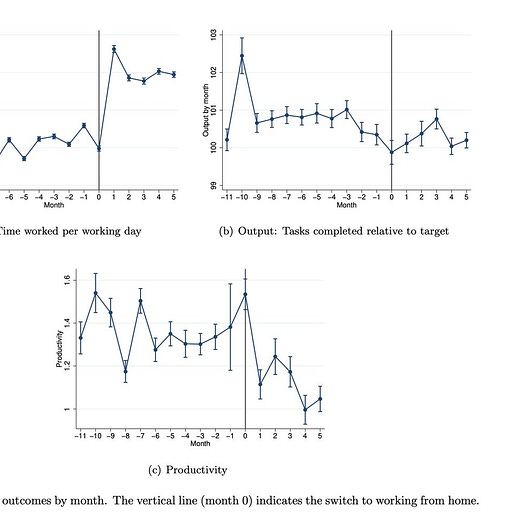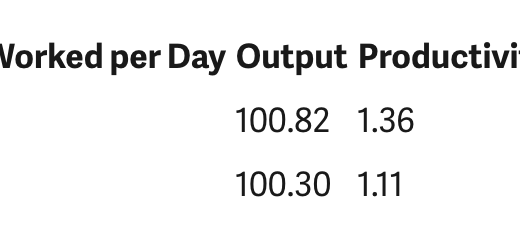Best of #econtwitter - Week of June 13, 2021
Jun 14, 2021
Welcome readers old and new to this week’s edition of Best of Econtwitter. Thanks to those sharing suggestions, over email or on Twitter @just_economics.
Paper summary threads

Ryan D. Enos@RyanDEnos
"Childhood Cross-ethnic Exposure Predicts Political
Behavior Seven Decades Later: Evidence from Linked
Administrative Data" in which we examine the very long-term (seven decades) effects of early life racial contact on politics much later in life.
advances.sciencemag.org
Childhood cross-ethnic exposure predicts political behavior seven decades later: Evidence from linked administrative data

6:16 PM · Jun 11, 2021
212 Reposts · 525 Likes

John Grigsby@JohnRGrigsby
When there's a large reform to top state tax rates, innovation falls in that state. The elasticity of patents to the net-of-tax rate is around 1-2 at the state-level depending on the specification. That's big! (~macro LS elast)
(Note x-axis in figure is residualized ln(1-taxes))

5:10 PM · Jun 9, 2021
1 Like

John Grigsby@JohnRGrigsby
Innovation tends to "stand on the shoulders of giants." If taxes reduce innovation in t, one might expect it to reduce innovation in t+k as well. Distributed lag regressions show that this is the case: these effects grow and persist for decades.

5:10 PM · Jun 9, 2021
1 Like

Ben Golub@ben_golub
A few simple facts that some people find surprising the first time they hear them.
Imagine $100 is behind door A or B and I give you independent hints about which. The hint says either A or B but is right only 55% of the time.
First hint is worth $5, second hint is worth... $0!
12:12 AM · Jun 10, 2021
39 Reposts · 380 Likes

Ben Golub@ben_golub
Why? Because the second hint never makes you *want* to change your decision. (Think about the four possible hint combinations.)
This is a key idea behind a beautiful paper by Meg Meyer, here:
2/

12:14 AM · Jun 10, 2021
4 Reposts · 99 Likes

Kirsten Bibbins-Domingo@KBibbinsDomingo
Work requirements for food stamps
⏩cut participation by 53%
⏩disproportionately screened out homeless participants
⏩didn’t increase employment
New @nberpubs
Employed in a SNAP? The Impact of Work Requirements on Program Participation and Labor Supply
nber.org
Employed in a SNAP? The Impact of Work Requirements on Program Participation and Labor Supply

4:04 PM · Jun 7, 2021
1 Repost · 8 Likes

Erin Wolcott@DrErinWolcott
**Updated CPS Non-Response Paper**
Households refusing the CPS have skyrocketed in recent years.😵 We find non-response bias accounts for nearly 20 percent of the decline in the unweighted participation rate since the turn of the millennium. bit.ly/wolcottresearch

9:52 PM · Jun 8, 2021
35 Reposts · 133 Likes

Carolina Arteaga Cabrales@caroartc
🚨New Paper Alert🚨 With @Viquibarone we have a new exciting paper on the causes & consequences of the opioid epidemic (tinyurl.com/3v599vsr). Let me tell you about (1/21)
tinyurl.com
3:09 PM · Jun 8, 2021
21 Reposts · 94 Likes

Simon Jäger@simon_jaeger
We, @shakked_noy, @Schoefer_B, and I, have new review paper: What Does Codetermination Do? A comprehensive overview of #codetermination (worker representation in firms’ governance and mgmt), we cover history, implementation, and best evidence on impacts economics.mit.edu/files/21562

6:27 PM · Jun 8, 2021
36 Reposts · 141 Likes

Flo Crivello@Altimor
Absolutely nuts paper by researchers from U Chicago analyzing the productivity of 10,000 workers before and after the pandemic.
Conclusions: WFH led to 2 more hrs of work per day, more meetings, less focus time, and *less productivity* bfi.uchicago.edu/wp-content/upl…



11:31 PM · Jun 10, 2021
1.02K Reposts · 4.06K Likes

Craig Garthwaite@C_Garthwaite
Without relitigating questions about that paper, we examine a different question:
Are there market expanding benefits from FDA review? Can FDA certification increase revenues?
After all, firms make investments based on expected profits, which are *revenues* minus costs (3/5)
11:22 AM · Jun 7, 2021
3 Likes

Will Diamond@wdiamond_econ
In this paper, we try to measure the “convenience yield” of safe assets like government debt- how much agents are willing to pay to hold a safe asset in addition to the present value of its cash flows. Akin to how we are willing to hold money although it pays no interest.
7:34 PM · Jun 12, 2021
1 Repost · 10 Likes
More: Floyd DiDs; misinfo warnings; CBDC design; caregiving marketing; toughness in negotiations; a nudge to save more didn’t work; self-insurance against job loss
Interesting discussions

Sylvain Catherine@sc_cath
2) EGHW argue that households should be sorted by wealth, not earnings. But wealth inequality among young adults is dwarfed by inequality in lifetime earnings. Sorting households by total wealth=wealth+ future earnings show that, for them, … 4/n

6:30 PM · Jun 8, 2021
4 Reposts · 16 Likes

Asjad Naqvi@AsjadNaqvi
Dropping a new @Stata guide on #workflow management. In this guide learn about file and folder structures, use of relative paths, globals/locals, naming conventions, code styling tips, and working across multiple dofiles.
The Stata Workflow Guide
link.medium.com
12:14 PM · Jun 7, 2021
83 Reposts · 424 Likes

Nick HK@nickchk
There is a certain amount of variation in the quantitative methods used across different fields
What proportion of that variation can be attributed to each of:
- Which methods are most appropriate by context
- Accidents of history
- Absolute differences in rigor/quality
- ???
5:19 AM · Jun 9, 2021
5 Reposts · 51 Likes

Karl T. Muth 🌐✈️📊@KarlMuth
I want to tell a story about why I think fieldwork is important. I happened to do my PhD at the London School of Economics, a place where fieldwork is highly-valued and where there is a tradition of important insights made in the field.
This is not true at all universities.
1/10

9:09 PM · Jun 10, 2021
48 Reposts · 215 Likes

Joshua Goodman@JoshuaSGoodman
Today and tomorrow, most students in the U.S. will be attending school in temperatures well above 90°F (32°C).
In school buildings without adequate air conditioning, most students will learn next to nothing given their (and teachers') physical discomfort.
2 relevant papers:
2:06 PM · Jun 7, 2021
316 Reposts · 1.06K Likes

scott cunningham@causalinf
I wanted so badly at one point to apply for one of those CIA jobs I’d sometimes see on the JOE. Does anyone know much about what economists in the CIA do? I was more mesmerized by the idea of it than the actual job description.
10:20 PM · Jun 11, 2021
1 Repost · 84 Likes

Matt Clancy@mattsclancy
A tweet from a good thread on how “bad” RCT results are received from funders. Reminiscent of issues related to publication bias.

Jessica Leight @leightjessica
Another puzzling (related) trend I’ve noticed is the emphasis on qual research as a “insurance policy”: i.e., add a qual substudy so we'll be sure to have some good news. I’m not a qual researcher, but fairly sure that doesn’t make sense.
10:44 PM · Jun 8, 2021
4 Likes

scott cunningham@causalinf
An economist and I were swapping stories. They said they chose econ PhD bc they wanted to advocate for people’s stories and Econ would have a big impact. I said I just love Econ and love the research process. Why’d you choose to become an economist? Explain it like I’m 5
11:10 PM · Jun 13, 2021
10 Reposts · 141 Likes

F a n t a T r a o r e theBuilder™@TheFantaTraore
#EconTwitter, this is a quick survey!
In one tweet: what book, topic area or examples made economics interesting to you and realize: woahhh, this is actually really cool?
12:28 PM · Jun 8, 2021
47 Reposts · 296 Likes

